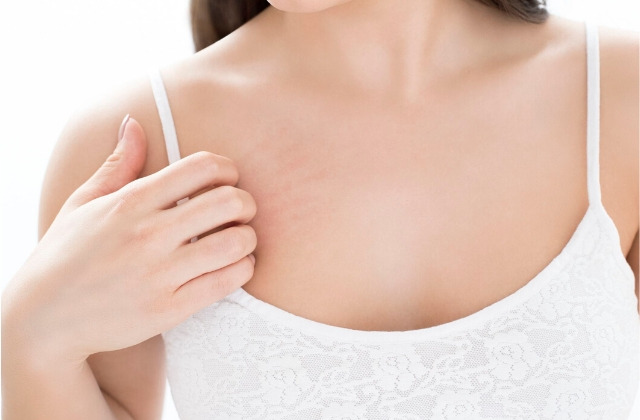It is common for new mothers to face several problems when they start breastfeeding. An itchy breast is one of the most common among those. In the majority of women having itchy breasts, the issue resolves on its own. It becomes a problem when it persists and interferes with feeding the baby.
In this article:
Is It Normal to Have Itchy Breasts while Breastfeeding?
What Causes Itchy Breasts when Breastfeeding?
Treatment for Itchy Breasts During Breastfeeding
Home Remedies to Manage Itchy Breast while Nursing
When to See a Doctor for Itchy Breast?
Is It Normal to Have Itchy Breasts while Breastfeeding?
Yes, it is normal to have itchy breasts while breastfeeding. Discomfort in the early weeks is a relatively common experience and it should go away over time. However, if it persists for long accompanied by pain that hinders the ability to feed, it is a sign of an existing problem.
What Causes Itchy Breasts when Breastfeeding?
The causes of itchy breasts when breastfeeding are –
Thrush
It is a yeast infection that causes itchy nipples during nursing. It is caused by a fungus called Candida that lives in the body. They are normally harmless but can multiply which grow out of control to cause an infection when any area of the body is moist for long periods of time. Due to the moist nipples of breastfeeding mothers, Candida is a common cause of infection and irritation.
Symptoms – The fungus mainly affects the nipple and areola of the breast which stays moist. Itchiness is often associated with a burning sensation, mostly after a feed and a throbbing pain deep in the breast tissue.
Mastitis
It is inflammation and deep breast tissue pain caused by a bacterial infection. It occurs as a result of the engorgement of the breast when the milk ducts retain excess milk. Cracked or pierced nipple can give an entry point for bacteria and infect the milk ducts and the surrounding tissue.
Symptoms – Swelling of the breasts, feeling full and soreness along with itchiness. Some women also feel a painful shooting sensation. The breasts are reddened and feel warm to touch. High fever in some cases.
Eczema
It is a range of skin conditions that can cause itchiness, inflammation and redness of the skin and affect both the skin on the breast and the nipples. One type which is common is contact dermatitis. It is caused by constant friction on the skin resulting from repeated breastfeeding.
Symptoms – Extremely dry and sensitive skin. The itch can become unbearable and worsen with scratching. Itchy rash on breasts while breastfeeding. Areas of dry and flaky skin.
Stretchy Skin
Since breasts are frequently filling and emptying, there is always a change in the breast tissue. This can cause it to expand and contract which results in stretched skin and itchy stretch marks. The effect is more prominent if the breast skin is un-moisturized in the dry seasons.
Symptoms – Fine lines on the breast skin that are tender. Stretch lines become dry and irritable. Moisturizing alleviates this condition.
Skin Infections
There are various types of skin infections that can cause the skin to become irritable. The most common ones are fungal infections like ringworm and scabies.
Symptoms – Ringworm is a fungal infection that results in the formation of circular rashes on the skin. It occurs in warm moist regions of the body like under the breasts. Scabies is an infection caused by the mite and causes fine rashes with red lines.
Treatment for Itchy Breasts During Breastfeeding
Treatment depends on the cause of the condition. Mostly, the conditions resolve on its own with little intervention, severe conditions require medication. It includes –
- Medication – Depending on the condition, the doctor would prescribe anti-fungal medicines that are safe for nursing mothers to treat conditions like ringworm and thrush. If the mother has scabies, a treatment regime will kill the scabies mites. In such cases, the baby is also checked for the mites and symptoms of the disease as it is easily transferred from skin-to-skin contact.
- Antibiotics – Bacterial infections in the breast require the use of antibiotics to treat the infection. The medicines given in such cases are compatible with breastfeeding and will not harm the baby’s health.
- Creams and Lotions for Dermatitis – Conditions like eczema are treated with lotions or creams that work by subduing the condition. Since eczema is also manageable without medications, the doctor might suggest remedial tips. Babies are unaffected by dermatitis.
Home Remedies to Manage Itchy Breast while Nursing
Many of the conditions that cause itchy breasts can be managed at home without medical intervention. Women who suffer from the itchy painful breast during breastfeeding can try these home remedies to manage it –
Keeping the Breasts Dry
Breast pads placed inside the bra will soak up any extra milk on the nipples or from a leak. Also, apply an over-the-counter antifungal powder under the breasts to keep the region dry and curb fungal growth. Drying the nipples after feeding sessions also helps prevent infection and cracking.
Wiping the Breast and Nipple Clean After Every Feed
A soft cloth moistened with warm water can be used to clean the breasts after every feed. It removes the baby’s saliva which can irritate the skin when left on it for a long time. It is also the best way to keep the breasts and nipples clean.
Using Moisturisers to Prevent Dry Nipples
While being moist all the time is problematic, the opposite can be just as troublesome. If the nipples tend to dry and crack, apply a bit of baby moisturizer on it. Preferably after the last feed of the day, wash the nipples and apply the moisturizer.
Wearing Loose-Fitting Clothing
Tight-fitting clothes like bra can trap moisture throughout the day. If having eczema, it can worsen the condition by irritating the skin. Therefore pick clothes that fit comfortably. Clothes that are made of natural fabric like cotton are ideal since they absorb moisture and maintain good ventilation.
Sticking to a Breastfeeding Schedule
Maintaining a regular and proper breastfeeding schedule and let to drain the breasts in time and avoid the accumulation of milk and engorgement. Weaning of the baby must also be done gradually so the mother won’t have a sudden build-up of milk in the breasts.
When to See a Doctor for Itchy Breast?
Consult the doctor if there is –
- Red, swollen breasts and itchy nipples
- Breast pain and itching accompanied by fever
- Intense itching sensation from deep in the breast tissue
- The baby’s tongue or mouth is white
- A lump in the breast that is painful or feels like an abscess
Conclusion
For any new mother, it is tricky to understand what is normal and what is not with breastfeeding. While home remedies are the first step to try and resolve the issue, doctor consultation is mandatory if the symptoms get progressively worse and do not improve.
References
- https://www.ncbi.nlm.nih.gov/books/NBK148955/
- https://www.ncbi.nlm.nih.gov/books/NBK153481/
- https://parenting.firstcry.com/articles/itchy-breast-during-breastfeeding-causes-and-remedies-to-comfort/
- https://www.medicalnewstoday.com/articles/322955













